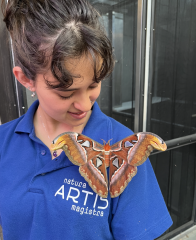 / The Tiny Happy People Project in the UK
Subscribe
/ The Tiny Happy People Project in the UK
Subscribe

However, as a first-generation daughter of immigrants, I never imagined I could go abroad and work in a completely new environment at only twenty years old. My summer working in the UK at the University of Sheffield’s Tiny Happy People Project (THP) was truly a rewarding experience. The THP Project was started by BBC in an effort to support child language development by providing families with videos on the topic. Researchers from the University of Sheffield then measured the effectiveness of such a program by studying participants who received those videos on development and a control group that received physical health-related videos.
As an intern in the psychology department, I had the opportunity to work on different parts of the project. I created and administered an online version of the home visits that they conducted for data collection, as many families were unable to have data collectors visit in person. These online visits included language assessments that scored a child’s expressive language, listening comprehension, receptive vocabulary, and ability to repeat sentences. Considering the short attention span of children, I had to devise ways to deliver the tasks in a way that was true to the original format while also making it fun for preschool-aged children. I found GIFs of popular cartoons with encouraging messages and included activities such as show-and-tell and rock-paper-scissors to build familiarity with the child and break up each task.
However, when conducting the online visits, there were often things that did not go according to plan. If a child missed their nap or grew annoyed by the repetitive nature of tasks, they would not cooperate or become irritated. As a result, there were instances where tasks were not completed or the data was null due to parental interference during tasks. These issues were something I discussed often with the speech-language therapist (SLT) I worked with, and it was so helpful to have her as my mentor. Her advice helped me continue to improve the online visits, but I also learned more about how SLTs problem-solve. I saw how the theory I learned in classes was applied in real research. Since I am interested in this career path, I loved seeing how the field is connected to both research and clinical practice, and that there is a way to balance both to best serve the community.
My summer experience involved a lot of data collection, but I also video-coded home recordings from families, which showed me a different perspective of the research. I measured parental responsiveness when playing with the child. Scoring was based on whether the responses were developmentally appropriate and included fluid interactions and child-centered speech. The researchers would remind the coders that, while we must score objectively, it is also important to remember that these were real families and we cannot judge the families based on a five-minute video. As a student in higher education, I am often faced with statistics and information that do not consider the story behind the numbers. So, this experience taught me a lot about research, but also about how to respect participants and be mindful of them as human beings.
Alongside research tasks, I also had a role in administrative tasks and worked on communication for participants’ families and recruitment for a future study. It was my first time using a phone with a cord, and I would dial caregivers and deliver information or remind them of appointments. I also used mail merge and a text-messaging service to deliver information. While calling and texting are things I am familiar with, I had never done it in an official setting, and I came to realize that each word and expression mattered in how the information was conveyed. I was especially touched by the care that the researchers gave to the families and how they made sure that the research was accessible. They alleviated any fears or concerns that were voiced.
There were many lessons I learned along the way, but aside from technical expertise, I was able to understand how ethics and respect were needed for a successful study. The Wellesley Honor Code holds students accountable for respect and integrity, which is also expected in coursework. However, I was able to see this exemplified in a work setting, and I want to carry those lessons with me into my future aspirations.




